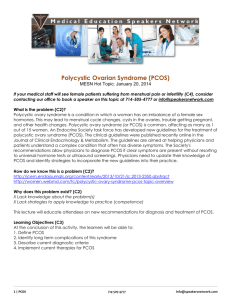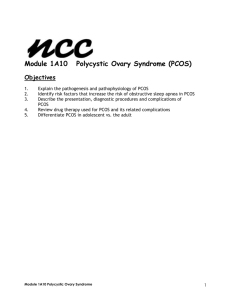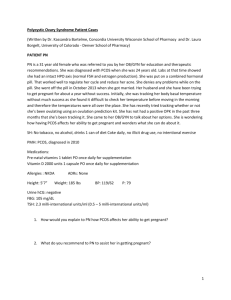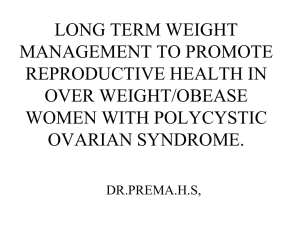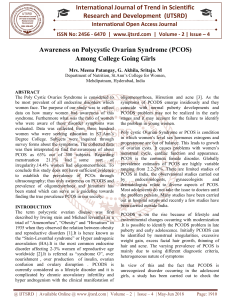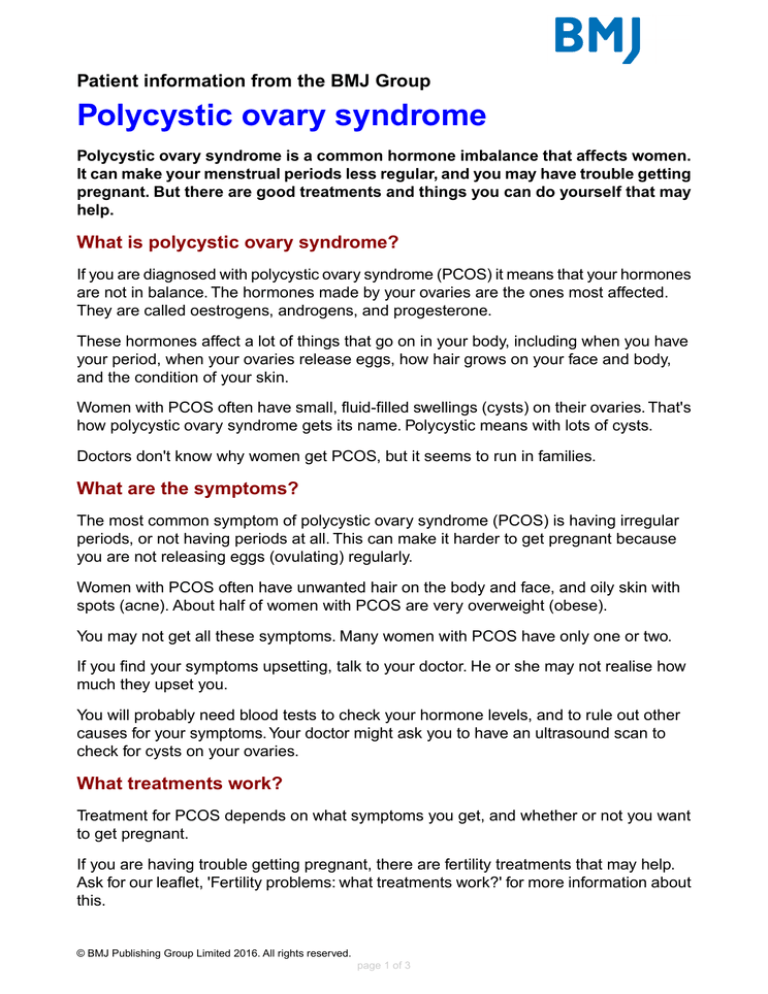
Patient information from the BMJ Group
Polycystic ovary syndrome
Polycystic ovary syndrome is a common hormone imbalance that affects women.
It can make your menstrual periods less regular, and you may have trouble getting
pregnant. But there are good treatments and things you can do yourself that may
help.
What is polycystic ovary syndrome?
If you are diagnosed with polycystic ovary syndrome (PCOS) it means that your hormones
are not in balance. The hormones made by your ovaries are the ones most affected.
They are called oestrogens, androgens, and progesterone.
These hormones affect a lot of things that go on in your body, including when you have
your period, when your ovaries release eggs, how hair grows on your face and body,
and the condition of your skin.
Women with PCOS often have small, fluid-filled swellings (cysts) on their ovaries. That's
how polycystic ovary syndrome gets its name. Polycystic means with lots of cysts.
Doctors don't know why women get PCOS, but it seems to run in families.
What are the symptoms?
The most common symptom of polycystic ovary syndrome (PCOS) is having irregular
periods, or not having periods at all. This can make it harder to get pregnant because
you are not releasing eggs (ovulating) regularly.
Women with PCOS often have unwanted hair on the body and face, and oily skin with
spots (acne). About half of women with PCOS are very overweight (obese).
You may not get all these symptoms. Many women with PCOS have only one or two.
If you find your symptoms upsetting, talk to your doctor. He or she may not realise how
much they upset you.
You will probably need blood tests to check your hormone levels, and to rule out other
causes for your symptoms. Your doctor might ask you to have an ultrasound scan to
check for cysts on your ovaries.
What treatments work?
Treatment for PCOS depends on what symptoms you get, and whether or not you want
to get pregnant.
If you are having trouble getting pregnant, there are fertility treatments that may help.
Ask for our leaflet, 'Fertility problems: what treatments work?' for more information about
this.
© BMJ Publishing Group Limited 2016. All rights reserved.
page 1 of 3
Polycystic ovary syndrome
Losing weight
If you are overweight, one of the first things that your doctor will suggest is losing weight.
Losing some weight, even if it's not much, may help your body to ovulate normally. This
may help with getting pregnant. However, it may not make much difference for unwanted
hair or acne.
Losing weight will work only if you are overweight. Don't try to lose weight if you're already
at a healthy weight. If you're not sure, ask your doctor.
No one diet has been shown to be better than another for helping women with PCOS
lose weight. The key is to find a diet you can stick to.
Hair removal
If your main problem is unwanted hair on your face and body, you've probably tried
different methods of hair removal. Shaving or using depilatory creams removes hair
above the root, but it grows back after a day or two. Waxing pulls hair out by the roots,
so it lasts a little longer. These treatments can be done at home or in a beauty clinic.
Electrolysis aims to damage the root of the hair, so it doesn't grow back at all. Laser
treatments slow down the growth of hair. After about four treatments, the hair may stop
coming back. But both treatments can be expensive and time-consuming, and some
women find them painful.
Lots of private clinics offer laser hair removal. If you decide to have this treatment, make
sure the clinic you choose is properly registered.
A cream called eflornithine slows down hair growth on the face. You have to get it from
a doctor. If other treatments have not helped, you could ask your doctor about it.
Medicines (if you want to get pregnant)
If you want to get pregnant, a medicine called metformin may help control your periods
and reduce unwanted hair. Metformin is also used to treat people with diabetes. It helps
control the levels of sugar in your blood. But it also seems to help some women with
PCOS. You're likely to have more regular periods if you take metformin. This might make
it easier for you to get pregnant.
Some women who take metformin have side effects. But these are mostly mild. You
might feel some nausea or heartburn, or get diarrhoea.
Other treatments can help stimulate your ovaries, so they are more likely to release eggs.
We have more information about these in the fertility treatment leaflet. Some examples
are clomifene and gonadotrophins.
Medicines (if you don't want to get pregnant)
If you don't want to get pregnant and you are having problems with irregular periods,
unwanted hair, or spots, your doctor may suggest you take the contraceptive pill. This
is the first medicine you are likely to be offered.
© BMJ Publishing Group Limited 2016. All rights reserved.
page 2 of 3
Polycystic ovary syndrome
The pill may make you put on weight. All women taking the combined oestrogen and
progestogen pill have a slightly higher risk of breast cancer and of getting a blood clot
in their veins (deep vein thrombosis).
If you've tried taking the pill and it hasn't helped, or if you have a lot of unwanted hair,
your doctor may suggest anti-androgen drugs. These reduce the amount of androgen
hormones in your body and may help reduce unwanted hair. They should only be
prescribed by a specialist. You have to be careful not to get pregnant while taking these
drugs, as they can harm your unborn baby. You'll need to take these drugs for a long
time (six months to 18 months) to see the full effect. If you stop taking them, the hair will
start growing back again.
Anti-androgen drugs have side effects which can be serious. You should discuss them
with your doctor before you start taking them.
Your doctor may also suggest metformin, sometimes along with either the pill or an
anti-androgen drug.
What will happen to me?
Polycystic ovary syndrome (PCOS) affects women in different ways, so it's hard to tell
what will happen to you.
Symptoms can be affected by anything that affects your hormones, like getting pregnant,
putting on or losing weight, or going through the menopause.
About 75 in 100 women with PCOS have trouble getting pregnant. But that doesn't mean
you won't be able to have children. Many women go on to have children, with or without
treatment.
In the long-term, you may be more likely to get diabetes. This may be because women
with PCOS have trouble regulating the amount of sugar in their blood. This happens to
between 1 and 10 in 100 women with PCOS and is more likely if you are overweight.
You can talk to your doctor about having regular diabetes tests.
Where to get more help
In the UK, a charity called Verity offers support for women with PCOS. For more
information, you may want to look at their website ( http://www.verity-pcos.org.uk ).
This information is aimed at a UK patient audience. This information however does not replace medical advice.
If you have a medical problem please see your doctor. Please see our full Conditions of Use for this content. These
leaflets are reviewed annually.
© BMJ Publishing Group Limited 2016. All rights reserved.
Last published: Mar 02, 2016
page 3 of 3


